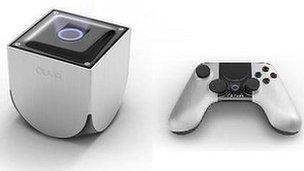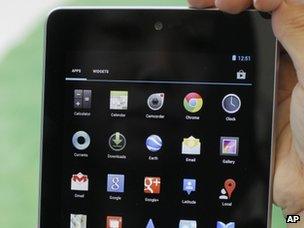Ouya game console smashes funding target
- Published

The finished console will be much smaller than existing living room gaming gadgets.
A plea for funds to help build a cheap games console has ended with nine times more cash donated than had been sought.
Ouya asked backers to pledge $950,000 (£606,000) via the Kickstarter website to turn designs for the console into a finished product.
By the time the pledge period ended on 9 August the total promised had hit $8,596,475, external (£5.8m).
The Ouya console is expected to go on sale in March 2013 and cost $99 (£63).
Pirate play
The gadget will be built around a processor made by graphics firm Nvidia that usually appears in smartphones, and will run Google's Android mobile operating system.
The link to Android means it will be able to play any game written for the mobile operating system. Most games will have to be re-worked to make them playable on the console.
The finished product is expected to be about the same size as a Rubik's cube and, said its creators, would let owners get at its innards to make their own modifications and write their own games.
Games companies including Square Enix, maker of the Final Fantasy series, and Namco Bandai, creator of Soul Calibur, have pledged their support. Ouya has also won backing from the OnLive game streaming service and the XBMC open source media player project.

Some Android games may not work well on a TV say experts
Ouya said it was planning to take pre-orders for the console via the web. Anyone who orders via this route will get their console in April 2013.
Wesley Yin-Poole, news editor of Eurogamer, said there was a degree of scepticism about Ouya among hard core gamers.
"Many are wondering if $8.6m is enough for a mainstream play-in-the-home console space," he said, adding that there were fears that a hackable console would become a pirate's playground.
Also, he said, there were worries about which games would be specifically made for the console.
"Nobody wants to play Tiny Wings on their fancy high definition telly," he said, "they want to play games made for their fancy high definition telly."
Despite this, he said, it was an "interesting proposition" because its openness stood in contrast to the largely closed worlds of the Xbox, PlayStation and Wii.
"If Ouya enjoys support from developers with games designed for a TV - smartphone and tablet games are not - it could see some success," he said.
- Published31 July 2012
- Published30 July 2012
- Published2 July 2012